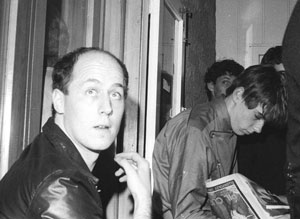In the mid 1970s I read and re-read a book about Phil Spector. It was a inspirational book for me at that age. Out of His Head by former (and later) Melody Maker editor, and one of the most important music journalists of his time, Richard Williams, was the first biography of Spector and indeed one of the very earliest serious biographies of a rock figure that wasn't all PR puffery and gloss (I'm thinking of The Beatles by Hunter Davies for example, which looked at the good bits and completely ignored anything that wasn't quite so, a little like the Beatles own Anthology too).
Williams wrote the book primarily about the man who made the music, and the music that the man made, the records that redefined what music production was (Williams revisits Spector here, post trial). He completely changed the way we create music and you hear his influence in almost every pop and rock record made to this day; and not only that, if it wasn't enough, he also invented the concept of the producer as an artist, not just a man (or woman) who sits in the booth and works out the balance between instruments, and he did this from his very first recording with the post-doo woppers, The Teddy Bears, in 1958.
Joe Meek, in the UK, was a little later but did much the same, although he didn't cause anything like the musical shockwaves that Spector did, even if he was arguably even crazier, and, yes, he took a life too.
When it came to The Beatles, neither Lennon nor Harrison had, by their own words, ever been produced as such as they were by Spector, a decade after his girl group period began, when he moulded what were for both, their finest solo records and radically different to those sixties pop symphonies but no less brilliant.
Spector's life and the life he enforced on others seems most demented and harrowing when you look at the life of poor Ronnie Spector, who's own book is pretty heavy reading. There is also a chapter in another book, Josh Alan Friedman's Tell The Truth Until They Bleed, where a tragic Ronnie Spector, divorced from Phil, broken and still in her early twenties, is, with yet another of the endless stream of no-name rocker boyfriends that she tagged on to or vice versa, staggering from oldies gig to oldies gig for a pittance, when, it can be said with some confidence that she possessed and maybe still does, one of the greatest female voices of her generation. Few come close, and those records, every one, the hits, the flops and the ones that seem to have completely slipped through the cracks before they were even released, are majestic symphonic pop masterpieces that can tear at your soul, and in my case, aged 16 when I first heard them, very much did.
I've just finished another Spector book, Mick Brown's Tearing Down The Wall Of Sound, which does just that, tears down the myth far more thoroughly than any of the earlier books, by making the story of creation of that music almost incidental to the monster that created it, as if the music was an inevitable by-product of the horror of his life. It's the story of the human train-wreck that Phil Spector was from that very first record through to the murder that eventually ended the his own life as well (unless by some miracle the appeal due shortly allows him to walk, it is after all California). The overwhelming tragedy is that he caused pain for just about everyone he touched, he was in every way possible, a monster and a monster for some fifty years.
But amongst all that there are still those mind-boggling records and I remain as confused as ever as to how we treat things like this. Do we dismiss the music, wipe the tracks I've posted below from pop music's historic record. No, I think not, it wasn't even really a question for me as The Fabulous Ronettes Featuring Veronica is still an album I would happily spend the rest of my days with, but it's a question raised by one of the projects I'm working on at the moment (and, no, I'm not about to make a record with Ronnie..I wish) and thus I voiced it.
In the meantime, the music stands, I guess, and I'm happily, and without guilt, going to post these wonders:
The big hit from Ronnie etc:
A couple of (towering) non-hits from The Ronettes:
A song from The Checkmates Ltd, which was really no longer of its time when Spector released it in '67, but sounds pretty fine 43 years on:
A snippet of Spector in the studio:
And this throughly bizarre video where the odious, convicted, and jailed for underage sex in a very predatory way, Jonathan King, pays tribute to the murderer Phil Spector, which is only really topped by the fact that Spector is, they say, in the same cellblock as Charles Manson, who so wanted to be a Beach Boy, a band who's music centre was besotted with Spector, so much so he had trouble speaking in his presence for years.
This odd matchup does, as way of justifying its inclusion, use as audio, another wonderful Spector produced track, from The Checkmates Ltd (a band who's one big hit, Black Pearl was also a big hit for the NZ band Moana & The Moa Hunters in the early 1990s), Love Is All I Have to Give:
It really is too odd....






3 comments:
Carnie Wilson remembers Brian playing 'Be My Baby' every morning. She'd hear the drums starting and think, oh - Dad's up.
Shame it didn't rub off on her, huh..
I suspect if Brian Wilson was your dad your aspirations would be to be as unlike him as possible.
Post a Comment